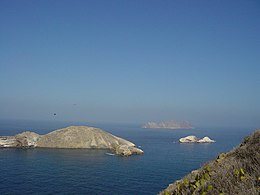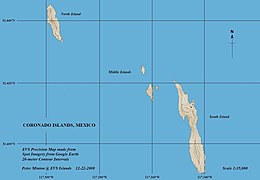Native name: Islas Coronado | |
|---|---|
 North Coronado (right background), Central Coronado (left midground), and Pile of Sugar (right midground) viewed from South Coronado (foreground) | |
 A map of the four Coronado Islands | |
| Geography | |
| Location | Southern California Bight |
| Coordinates | 32°25.05′N 117°15.63′W / 32.41750°N 117.26050°W |
| Major islands | 4 |
| Administration | |
| State | Baja California |
| Municipality | Tijuana Municipality |
The Coronado Islands (Islas Coronado or Islas Coronados; English: Islands of the Coronation(s); Kumeyaay: Mat hasil ewik kakap) are a group of islands located 13 km (8 mi) off the northwest coast of the Mexican state of Baja California. Battered by the wind and waves, the rocky islands are mostly uninhabited except for a small military detachment and a lighthouse keeper. Despite their barren appearance, they serve as a refuge for seabirds and support a sizable number of plants, including 6 endemic taxa found only on the islands. The waters around the islands support a considerable amount of diverse marine life.[1]
Used extensively and intermittently by the indigenous peoples for thousands of years, the first European explorers sighted them in 1542. Centuries later, they served as weekend getaway locations, secret gambling spots, and smuggling sites until the Mexican Navy clamped down on trespassing. The tied island city of Coronado, California, 27 km (17 mi) to the north, was named in honor of the islands after an 1886 naming competition.[2][3] During World War II, the islands were utilized in joint training exercises between Mexico and the United States, but gained notoriety when future founder of Scientology, L. Ron Hubbard, shelled the inhabited island, earning the ire of the Mexican government. Today, the islands are a Mexican wildlife refuge; visitors may anchor, scuba, and snorkel, but setting foot on the islands is prohibited without special permission from the government.[4]
- ^ Cite error: The named reference
UNEPWorkshopwas invoked but never defined (see the help page). - ^ "History of Coronado". Coronado Chamber of Commerce. 2012. Retrieved 4 March 2022.
Coronado was named for the Coronado Islands off the coast of San Diego. They were first sighted November 8, 1602 by Spanish navigator Vizcaino. He named them "Los Coronados" or "the crowned ones," for four martyred saints of ancient Rome whose death had been on that day.
- ^ Letchworth, Dan (8 January 2020). "Why Do People Call It Coronado Island When It's a Peninsula?". San Diego Magazine. Retrieved 4 March 2022.
- ^ Cite error: The named reference
Ellsberg1970was invoked but never defined (see the help page).
